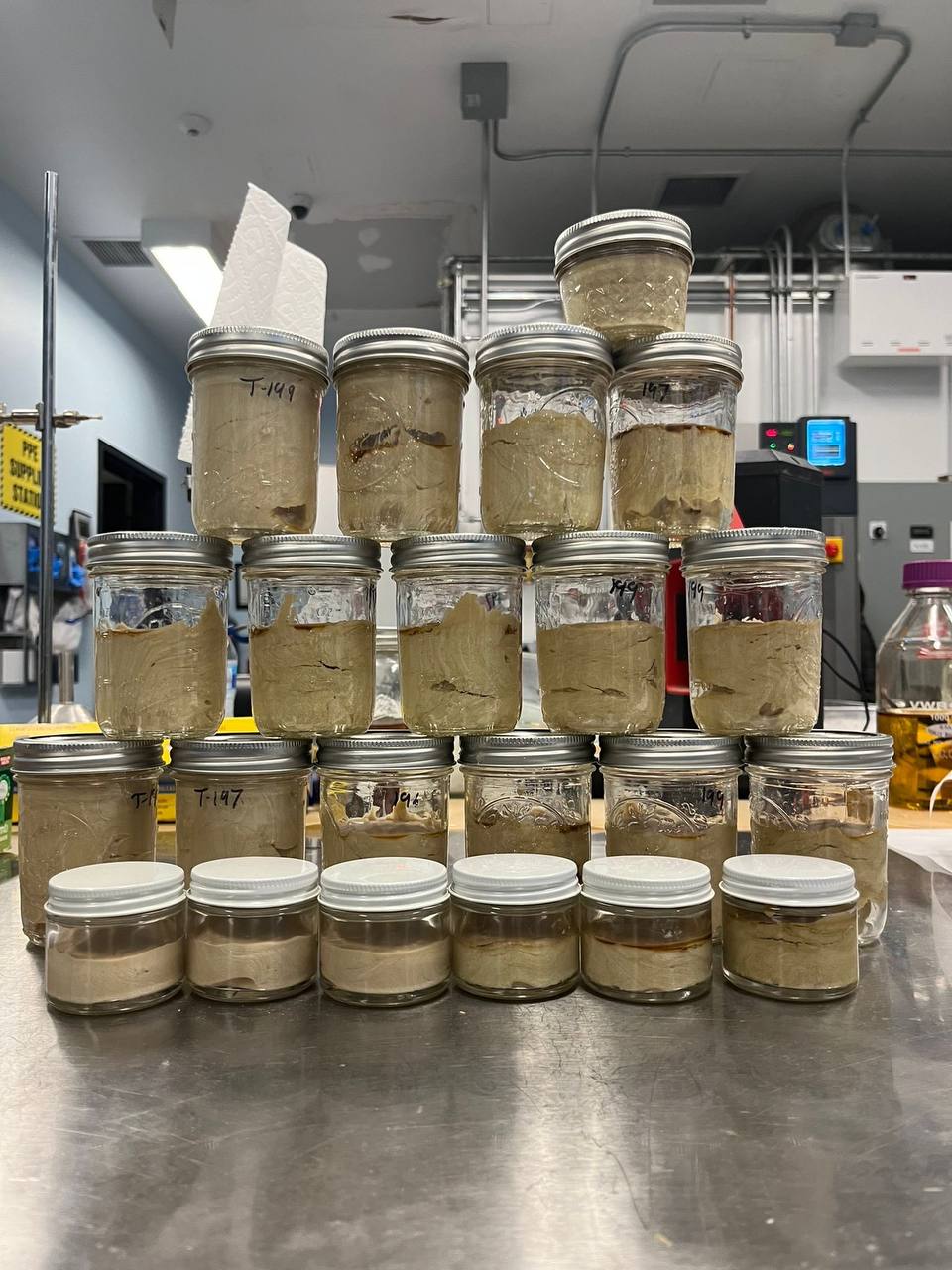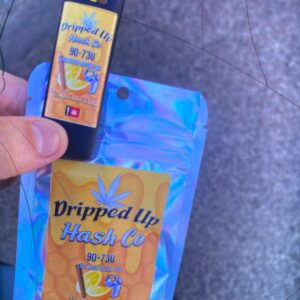THCA Hash Rosin
An In-Depth Description
Introduction
THCA Hash Rosin represents a significant advancement in cannabis concentrates, combining the therapeutic benefits of THCA (tetrahydrocannabinolic acid) with the potent qualities of hash rosin. This description provides an in-depth exploration of THCA Hash Rosin, detailing its composition, production methods, properties, medical applications, potential risks, legal status, and future outlook.
1. What is THCA Hash Rosin?
THCA Hash Rosin is a solventless cannabis concentrate that harnesses the therapeutic potential of THCA, a non-psychoactive precursor to THC, through the process of hash rosin extraction. This method involves applying heat and pressure to cannabis plant material, yielding a high-purity extract rich in cannabinoids and terpenes.
2. Brief History of THCA Hash Rosin
The evolution of THCA Hash Rosin parallels the development of hashish and rosin techniques. Hashish, a traditional concentrate, has been used for centuries. Advances in extraction methods and a growing preference for solventless extracts have led to the rise of THCA Hash Rosin, reflecting a shift towards purer, more potent cannabis products.
3. Importance and Growing Popularity of THCA Hash Rosin
The popularity of THCA Hash Rosin has surged due to its high potency, purity, and therapeutic potential. Its solventless extraction process avoids harmful chemicals, making it a preferred choice for both recreational users seeking intense effects and medical patients looking for effective, clean cannabis solutions.
4. Purpose and Organization of this Description
This description aims to provide a comprehensive understanding of THCA Hash Rosin by covering its composition, production methods, properties, medical uses, risks, legal status, and consumption tips. Each section offers detailed insights into various aspects of this intriguing cannabis extract.
Section 1: Understanding THCA Hash Rosin
1.1 What is THCA?
a. Definition and Composition of THCA
THCA (tetrahydrocannabinolic acid) is a non-psychoactive cannabinoid present in raw cannabis plants. It is the precursor to THC, the primary psychoactive compound. THCA is known for its potential therapeutic properties, including anti-inflammatory, neuroprotective, and antiemetic effects.
b. THCA vs. THC
THCA and THC differ primarily in their effects. THCA is non-psychoactive and does not produce a “high,” while THC is responsible for the psychoactive effects of cannabis. THCA converts to THC through processes like heating, which decarboxylates the compound.
1.2 What is Hash Rosin?
a. Definition and Manufacturing Process of Hash Rosin
Hash Rosin is a solventless concentrate obtained by applying heat and pressure to cannabis plant material, such as trichome-rich buds or sifted resin. This method extracts the resin glands containing cannabinoids and terpenes without the use of solvents.
b. Key Differences between Traditional Hash and Hash Rosin
Traditional hash involves physical techniques like sieving or pressing to extract resin glands. Hash Rosin, however, uses a specific combination of heat and pressure, resulting in a high-purity concentrate with a more refined terpene profile.
1.3 How is THCA Hash Rosin Produced?
a. Extraction Techniques: Solventless vs. Solvent-based
THCA Hash Rosin can be produced through solventless methods, such as ice water extraction or dry sieve, which rely on mechanical separation. Solvent-based techniques, including hydrocarbon or alcohol extraction, use chemical solvents followed by their removal.
b. Role of Heat and Pressure in THCA Extraction
In THCA Hash Rosin production, heat and pressure are crucial. Heat facilitates the decarboxylation of THCA to THC, while pressure helps to rupture trichome heads and release resinous material, resulting in a concentrated extract.
Section 2: Properties and Characteristics of THCA Hash Rosin
2.1 Appearance and Texture
THCA Hash Rosin varies in appearance and texture depending on the starting material and production method. It is commonly sticky and may range from translucent to opaque, often with a golden or amber color.
2.2 Aroma and Flavor Profile
The aroma and flavor of THCA Hash Rosin are influenced by its terpene profile, which can include earthy, citrusy, piney, floral, fruity, or spicy notes. The complex flavor profile enhances the sensory experience of consumption.
2.3 THC Content and Potency
THCA Hash Rosin is known for its high THC content, ranging from 60% to over 90%. Its potency makes it popular among users seeking intense effects and precise dosing, whether for recreational or medicinal purposes.
2.4 Compatibility with Different Consumption Methods
THCA Hash Rosin is versatile and can be used in various ways, including vaporization with dab rigs or vaporizers, incorporation into edibles or tinctures, and topical application for localized relief.
2.5 Shelf Life and Storage Recommendations
To maintain quality, THCA Hash Rosin should be stored in a cool, dark place in airtight containers. Proper storage can extend its shelf life from several months to a year while preserving potency and terpene profile.
Section 3: Medical and Therapeutic Applications of THCA Hash Rosin
3.1 Potential Health Benefits of THCA
a. Anti-inflammatory and Analgesic Properties
THCA has potential anti-inflammatory and pain-relieving effects, useful for managing conditions like arthritis, muscle spasms, and neuropathic pain.
b. Antiemetic and Appetite-Stimulating Abilities
THCA may reduce nausea and vomiting, particularly in cancer patients undergoing chemotherapy, and stimulate appetite, benefiting those with reduced appetite or wasting syndrome.
c. Neuroprotective and Antioxidant Effects
THCA’s neuroprotective qualities and antioxidant properties may aid in managing neurodegenerative disorders like Parkinson’s and Alzheimer’s, as well as combat oxidative stress in the brain.
d. Other Potential Medical Applications
Research suggests THCA may be beneficial for conditions such as epilepsy, multiple sclerosis, migraines, and PTSD, although further studies are needed.
3.2 THCA Hash Rosin as a Treatment for Specific Conditions
a. Chronic Pain and Inflammation
Hash Rosin’s anti-inflammatory and analgesic effects offer potential relief for chronic pain and inflammation, providing an alternative to conventional pain medications.
b. Nausea and Vomiting (e.g., in Cancer Patients)
The antiemetic properties of Hash Rosin can help alleviate chemotherapy-related nausea and vomiting, with its high potency facilitating effective symptom management.
c. Neurodegenerative Disorders (e.g., Parkinson’s, Alzheimer’s)
Hash Rosin may help manage symptoms of neurodegenerative disorders due to its neuroprotective effects. However, more research is required to confirm its efficacy.
d. Conventional Treatments vs. THCA Hash Rosin
Comparing THCA Hash Rosin to conventional treatments highlights potential advantages like fewer side effects and targeted effects. Consultation with healthcare professionals is essential for personalized treatment plans.
e. Clinical Studies and Research Supporting Therapeutic Use
Ongoing research supports the therapeutic use of cannabis, including THCA Hash Rosin, though comprehensive clinical studies are needed to establish recommended dosing, safety, and efficacy.
Section 4: Potential Risks and Side Effects of THCA Hash Rosin
4.1 Psychotropic Effects and Psychoactivity
Due to its THC content, Hash Rosin may cause psychoactive effects, impacting cognitive functions and perception. Users should exercise caution, especially when inexperienced or operating machinery.
4.2 Potential Allergic Reactions
Some individuals may experience allergic reactions to cannabis or terpenes, manifesting as respiratory symptoms, skin irritation, or gastrointestinal distress. Consulting a healthcare professional is recommended if concerns arise.
4.3 Respiratory Risks
Inhalation methods like vaporization may pose risks to the respiratory system. The long-term effects of inhaling THCA Hash Rosin on lung health are still under investigation, particularly for those with pre-existing conditions.
4.4 Interactions and Compatibility with Other Medications
Hash Rosin may interact with medications metabolized by the liver’s cytochrome P450 enzyme system. Consulting with a healthcare professional is crucial when using THCA Hash Rosin alongside prescribed medications.
4.5 Long-Term Effects and Public Health Concerns
Further studies are needed to understand the long-term effects of THCA Hash Rosin. Public health discussions continue on potential societal impacts and ongoing legalization efforts.
Section 5: Legal Status and Regulation of THCA Hash Rosin
5.1 Current Legal Status of Hash Rosin
The legality of Hash Rosin varies by jurisdiction, with some regions permitting its use for medical and recreational purposes, while others impose restrictions. Understanding local laws is essential for compliance.
5.2 Differences in Legalization and Regulation Across Countries and States
Cannabis legalization and regulation vary widely across countries and states, affecting market availability and product quality. Familiarity with local regulations helps in making informed decisions about Hash Rosin.
5.3 Influence of Legislation on Market Availability and Quality Control
Legislation impacts the availability and quality of Hash Rosin. In regions with strict regulations, producers prioritize quality control, ensuring accurate labeling and third-party lab testing for safety and potency.
Section 6: Consumption and Usage Tips for Hash Rosin
6.1 Recommended Dosage and Usage Guidelines
Due to its potency, beginners should start with small amounts of THCA Hash Rosin and gradually increase to find their ideal dosage. Monitoring individual tolerance levels is important for a safe experience.
6.2 Different Methods of Consumption
a. Vaporizers and Dab Rigs
Vaporization is a common method for consuming Hash Rosin, offering efficient delivery through devices like dab rigs or vaporizers for rapid.













